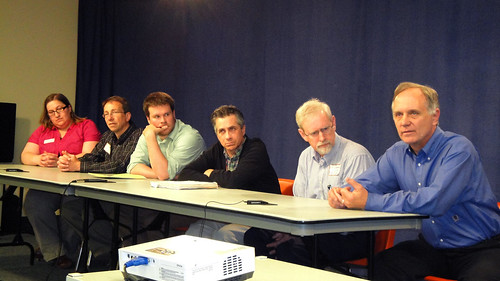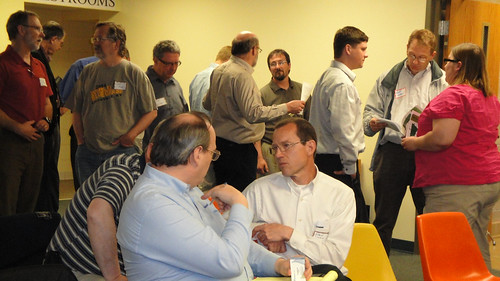May 12, 2011, New Ulm, MN: Could there be a profitable use for “waste” and other effluents, through use of biogas digesters? Over 40 people met to learn the answer to this and other questions at an event hosted by Southwest Clean Energy Resource Team (SW CERT) held in the lower level of the New Ulm Public Library on May 12th, 2011.
What is biogas? Simply put, biogas digesters convert manure or other organic matter into biogas through anaerobic digestion. Biogas can be combusted to create electricity, used to heat water, or injected into a natural gas pipeline.
Joel Haskard, Co-Director for Clean Energy Resource Teams (CERTs) welcomed folks and introduced the panelists.
 Amanda Bilek, Energy Policy Specialist at Great Plains Institute, presented an overview of the biogas industry nationally and in Minnesota. It may come as no surprise to folks in the New Ulm area that Germany leads Europe in biogas production. In the U.S., Wisconsin leads in farm-based anaerobic digestion projects, followed by New York, Pennsylvania, and California, according to Bilek.
Amanda Bilek, Energy Policy Specialist at Great Plains Institute, presented an overview of the biogas industry nationally and in Minnesota. It may come as no surprise to folks in the New Ulm area that Germany leads Europe in biogas production. In the U.S., Wisconsin leads in farm-based anaerobic digestion projects, followed by New York, Pennsylvania, and California, according to Bilek.
“Biogas digester systems are expensive, and unless policies and incentives are in place to help folks, it’s cost prohibitive for most farmers. Wisconsin already has several effective incentives in place,” explained Bilek.
Food and beverage processing facilities can also create biogas. In Minnesota, American Crystal Sugar (East Grand Forks), Seneca Food Corporation (Montgomery) and SunOpta Ingredients, Inc. (Cambridge) are turning their “waste” into biogas.
 Jake Fischer, Clean Energy Program Manager at The Minnesota Project, presented the example of Haubenschild Farm’s Dairy methane digester, which has 850 dairy cows in production plus 100 in dry lot. “The plug-flow digester has been extremely efficient,” stated Fischer.
Jake Fischer, Clean Energy Program Manager at The Minnesota Project, presented the example of Haubenschild Farm’s Dairy methane digester, which has 850 dairy cows in production plus 100 in dry lot. “The plug-flow digester has been extremely efficient,” stated Fischer.
William Lazarus, Professor in the Department of Applied Economics, University of Minnesota Extension, examined the economics of biogas digesters. Lazarus listed potential benefits of biogas digesters including: energy, odor control, reduced methane, reduction in pathogens, solids (fiber) for bedding, solids as a soil amendment, solids used for energy, and phosphorus and nitrogen reduction.
Costs of biogas digester systems vary depending on the size of the operations. Panelists stated that due to the high cost, funding incentives and government grants are key for those looking to install biogas digesters.
After a round of questions from the audience and a break, speakers on a second panel addressed Minnesota biogas projects.
 David Schmidt, Assistant Extension Engineer, Department of Bioproducts and Biosystems Engineering at the University of Minnesota, presented the case of Jer-Lindy Farms dairy digester, which has 135 milking cows and uses an Andigen digester.
David Schmidt, Assistant Extension Engineer, Department of Bioproducts and Biosystems Engineering at the University of Minnesota, presented the case of Jer-Lindy Farms dairy digester, which has 135 milking cows and uses an Andigen digester.
Kevin Hennessy, Associate Scientist in Co-Products at Agricultural Utilization Research Institute (AURI), provided examples of how AURI has developed new uses for and value-added improvements to Minnesota agricultural commodities.
Bob Peplin explained how Agri-Waste Energy, Inc. and its strategic partners have used a gas conditioning facility to turn raw biogas from digesters into pipeline-quality gas, which they have sold and exported to other parts of the nation.
Meeting attendees networked after panelists responded to questions from the audience.
“We hope this forum helped folks gain a better understanding of the opportunities and challenges of using biogas digesters in southern Minnesota,” states Jeff Vetsch, WC and SW CERT Coordinator. “Size of the farm operation and available incentives are important when people are considering the economic feasibility of biogas digesters. As this forum demonstrated, there is a lot of interest and expertise in Minnesota, and communities should connect with these speakers if they’re interested in learning more.”
- Amanda Bilek, Great Plains Institute
- Jake Fischer, The Minnesota Project
- Bill Lazarus, University of Minnesota Department of Applied Economics
- David Schmidt, University of Minnesota Department of Bioproducts & Biosystems Engineering
- Kevin Hennessy, Agricultural Utilization Research Institute
- Bob Peplin, Agri-Waste Energies, Inc.
See more photos from the event here or in the slideshow below.
